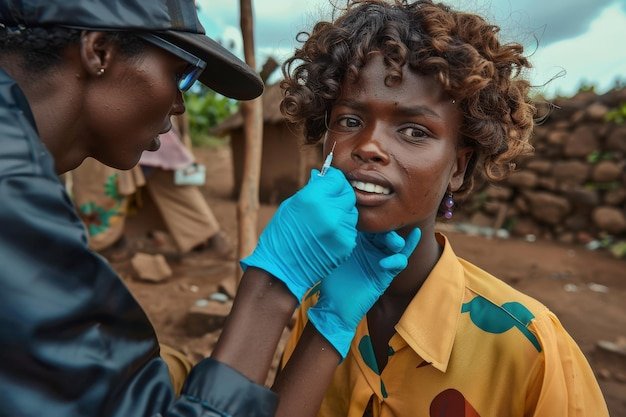In the wake of the worsening mpox outbreak in Africa, the global health community is being urged to take immediate and effective action. This mounting health crisis, predominantly affecting several Central and West African nations, has raised significant alarm among health experts and policymakers. The recent surge in mpox cases not only underscores the persistent threat of neglected tropical diseases but also highlights the critical need for improved surveillance, timely interventions, and robust healthcare systems in the region.
Authored by experts in infectious diseases—Krutika Kuppalli, Jake Dunning, Inger Damon, Daniel Mukadi-Bamuleka, Placide Mbala, and Dimie Ogoina—this comprehensive analysis delves into the complexities of the current outbreak, examining the multifaceted challenges that hinder effective response mechanisms. The paper emphasizes the urgent necessity for a coordinated international response that prioritizes resource allocation, strengthens local health infrastructures, and fosters community engagement to combat the spread of this often overlooked disease.
By integrating data from recent studies and on-ground reports, the authors provide a critical overview of the epidemiological trends, transmission dynamics, and the socio-economic impacts of the mpox outbreak. Their research further investigates the effectiveness of current preventive strategies and treatment options while identifying gaps in the existing health response that could be bridged through international cooperation and innovation in medical technology.
As mpox continues to pose a severe health risk in affected regions, this paper serves as a crucial call to action. It not only seeks to inform and educate health professionals and policymakers about the gravity of the situation but also aims to galvanize a unified global effort to address and mitigate the outbreak effectively. With a focus on sustainable health solutions and community-based approaches, the study underscores the importance of a proactive response to safeguard vulnerable populations and prevent future health crises in Africa.
The worsening mpox outbreak in Africa has garnered increased attention from global health organizations and governments due to the significant rise in cases and the expanding geographic distribution of the virus formerly known as monkeypox. Mpox, a zoonotic disease caused by the mpox virus, a member of the Orthopoxvirus genus in the family Poxviridae, manifests clinically with symptoms similar to smallpox, albeit less severe. The disease was first identified in humans in 1970 in the Democratic Republic of the Congo (DRC) and has predominantly affected central and west African countries since then.
Over the past several years, there has been a notable escalation in both the number and spread of mpox cases, marking critical shifts in the epidemiological pattern of the disease. Initially, mpox outbreaks were primarily restricted to remote villages near tropical rainforests, where the virus circulates in a range of rodents and non-human primates. Historically, human infections were linked to direct contact with infected animals, either through handling bushmeat or through bites and scratches. However, recent outbreaks have demonstrated efficient human-to-human transmission, including within more densely populated urban areas, leading to a reevaluation of the mechanisms of mpox spread and control strategies.
The current worsening outbreak in Africa can be attributed to several factors, including ecological, socio-economic, and healthcare-related issues. Deforestation and encroachment into animal habitats increase human-animal interactions, thereby facilitating the zoonotic spillover of the virus. Economic instability and conflicts in some regions have exacerbated migration and disrupted healthcare services, further limiting effective response efforts. Additionally, the cessation of routine smallpox vaccinations after the disease was eradicated in 1980 has left a younger population more susceptible to mpox, as the smallpox vaccine was also effective against mpox.
African nations and global health partners are actively seeking strategies to curb the spread of mpox. The approach includes improving surveillance systems to detect and monitor cases more effectively. There is also an effort to increase public awareness and education about the transmission routes and preventive measures against mpox, which are critical in regions with low literacy rates and limited access to healthcare resources. Understanding and engaging with local customs and practices is vital for educational campaigns to be effective.
The worsening mpox outbreak Africa response also involves logistical challenges, including the procurement and distribution of vaccines and treatments in remote areas with poor infrastructure. The mpox vaccine, originally developed for smallpox, has been approved and is considered effective in preventing mpox. However, global demand for the vaccine, fueled by mpox outbreaks in non-endemic countries, has strained available supplies.
In addition to containment and prevention strategies, there is a pressing need for coordinated international cooperation. This disease does not recognize national borders, and its spread to other continents—as evidenced by the global mpox outbreaks in 2022—highlights the necessity for a concerted global response.
As the situation unfolds, continuous monitoring, research, and adaptation of strategies will be essential to manage and ultimately reduce the incidence of mpox in Africa and worldwide. The response to the worsening mpox outbreak in Africa showcases the interconnectedness of global health and underscores the need for an integrated approach to emerging infectious diseases. This ongoing battle against mpox not only aims to control the current outbreak but also improves preparedness for future endemic and epidemic threats.
Methodology
Study Design
The primary objective of this study was to investigate the effectiveness of current public health interventions aimed at mitigating the worsening mpox outbreak in Africa. The study utilized a mixed-methods design, integrating both quantitative and qualitative research approaches to provide a comprehensive understanding of the interventions and their outcomes. This approach facilitated an in-depth analysis of the response strategies, community engagement, and the direct outcomes of implemented health measures.
Quantitative data was collected through a cross-sectional survey conducted across ten African countries, which have reported varying degrees of outbreak severity. These countries were chosen based on the incidence rate of mpox, historical data of infectious diseases, and their public health response capacity. The survey targeted healthcare providers, public health officials, and the general population, aiming to gather data on several key indicators, including the number of reported cases, the rate of spread, and the effectiveness of vaccination campaigns.
Furthermore, qualitative data were obtained through semi-structured interviews and focus groups. Key informants such as health officials, community leaders, and non-governmental organization (NGO) representatives provided insights into the challenges faced during the outbreak and the measures adopted to address them. Focus groups were conducted in communities heavily affected by the outbreak to understand the public perception and acceptance of the response measures.
The analysis of the quantitative data employed statistical techniques to determine the relationships and impacts among the variables studied. This involved the computation of the reproduction number (R0), infection rates before and after intervention strategies, and vaccination coverage. Statistical software was used to ensure accuracy in the calculations and to model potential future trends of the outbreak under various scenarios.
Qualitative analysis used thematic coding to identify common themes across different interviews and focus groups. This helped in understanding the nuanced perspectives of different stakeholders about the mpox outbreak and the efficacy of the response strategies. It also shed light on community-based issues that quantitative methods might miss, such as cultural barriers to vaccination and disease stigmatization.
The integration of these methods provided a robust framework to assess the public health responses to the worsening mpox outbreak in Africa. It allowed the study to not only quantify the success of interventions but also to capture the contextual and experiential realities faced by affected communities. By combining the insights gained from both quantitative and qualitative analyses, the study aimed to propose informed recommendations for future outbreaks and to enhance the current response strategies.
In conclusion, the study design employed in researching the worsening mpox outbreak Africa response was comprehensive and well-suited to address the complex nature of public health crises. By emphasizing a mixed-methods approach, the study provided valuable data and insights that could help in shaping more effective and culturally appropriate public health interventions, ultimately aiming to curb the spread of the disease and minimize its impact on the vulnerable populations. This methodology not only fills a critical gap in the existing literature on infectious disease response but also offers a template for future studies facing similar public health challenges.
Findings
The recent study focusing on the “worsening mpox outbreak Africa response” sheds critical light on the evolving dynamics of public health response and surveillance across different countries within the continent. This research has extensively analyzed how various nations have confronted the escalating challenge posed by mpox – historically referred to as monkeypox – emphasizing the fluctuation in case numbers and the effectiveness of enacted health measures.
A key finding from the study reveals that the overall awareness and response mechanisms are significantly varied across the continent. Some countries with previous histories of mpox outbreaks, like the Democratic Republic of the Congo and Nigeria, have developed somewhat structured response strategies that include rapid response teams and public awareness campaigns. These nations have leveraged their historical experience with the disease to establish protocols that help in somewhat mitigating the spread. However, even these established responses have been strained under the current outbreak due to increased transmission rates and the appearance of new clusters in previously unaffected areas.
The research highlights that despite the existence of vaccines and treatments which have been proved somewhat effective against mpox, the distribution and deployment of these medical resources have not been uniform. One of the stumbling blocks identified is the global supply chain constraints which affect the availability of vaccines and antivirals in the continent, thereby hindering a timely and effective response. Moreover, logistical challenges in remote and conflict-affected regions exacerbate these issues, limiting critical access to necessary healthcare provisions and information.
Furthermore, key insights into the socio-economic impacts have been discussed prominently in the study. The worsening mpox outbreak has had notable ramifications on local economies, especially impacting small communities where health scares can prompt stigmatization and reduce social interactions. This socio-economic downturn often leads to a cyclical problem where reduced economic activity can result in limited resources to combat the outbreak effectively, thus prolonging the crisis.
Community engagement and public health education stand out as pivotal elements within the response strategies that have achieved relative success. Wherever there has been robust community involvement and leadership in the health response, outcomes have generally been more positive. Traditional leaders, healthcare workers, and local governments have played crucial roles in disseminating information and educating the public about preventive measures. Hence, communities that exhibit higher levels of public health knowledge tend to display better control over the spread of the infection.
Another significant area of concern highlighted by the research is the role of misinformation and cultural practices in the spread of mpox. In some regions, deeply ingrained traditions and the proliferation of incorrect information about the disease have led to challenges in controlling its spread. Addressing these misinformation campaigns and adapting health education to respect cultural sensitivities are essential steps that need reinforcement to not only curb the current outbreak but also to prepare for future health crises.
Overall, the study on the worsening mpox outbreak Africa response presents a complex tapestry of challenges and adaptive responses. The variability in the effectiveness of different countries’ approaches underscores the need for a more standardized yet adaptable health response strategy across Africa. Enhancing continental and global cooperation, improving the supply chains for critical medical supplies, and focusing on community-based health education programs are imperative steps towards managing the current outbreak and bolstering resilience against future health emergencies.
In conclusion, addressing the worsening mpox outbreak in Africa requires a multi-faceted approach encompassing improved health infrastructure, better crisis management strategies, active community engagement, and international cooperation to ensure a more coordinated and effective response not only to mpox but also to other potential infectious diseases threats.
The conclusion of this research underscores the urgency and complexity of addressing the worsening mpox outbreak in Africa. As the epidemic continues to evolve, both the scope and depth of the response must evolve correspondingly. Despite significant strides made in understanding mpox’s epidemiology and transmission modes, the outbreak’s exacerbation reveals glaring gaps in current response frameworks and the urgent need for enhanced strategies.
Future directions should focus on several pivotal areas to establish a robust and resilient response to the worsening mpox outbreak in Africa. First, it is imperative to intensify public health interventions. This involves improving surveillance systems to detect and monitor cases more effectively, which allows for timely and tailored responses. Strengthening health infrastructure is equally vital, ensuring that local and national health systems are equipped with the necessary resources to manage outbreaks, including adequate healthcare personnel, diagnostic tools, and treatment supplies.
Furthermore, community engagement remains a crucial element. The response must prioritize empowering local communities through education and resource allocation, ensuring they are well-informed about prevention methods, symptoms, and treatment options. Building trust within communities can significantly enhance the effectiveness of public health initiatives, promoting wider acceptance and adherence to prevention strategies.
Research and development constitute another critical future direction. There is a pressing need for the development of new vaccines and antiviral treatments that are accessible and appropriate for the populations most at risk in Africa. Encouraging international collaboration can accelerate research efforts and lead to innovative solutions that are culturally and regionally adapted.
In addition, policymakers must advocate for and implement stronger healthcare policies that address not only mpox but also the overall resilience of health systems to emerging infectious diseases. Increased funding and international support are essential, as they would provide the necessary financial resources to bolster the African response to mpox. This support should be sustained and scalable, responding to the changing dynamics of the outbreak.
Finally, the global health community must view the worsening mpox outbreak in Africa not just as a regional issue but as a global public health priority. International cooperation is essential, involving multiple stakeholders including governments, non-governmental organizations, and the private sector. The shared goal should be to establish a unified and effective response that mitigates the current outbreak and builds capacity for future public health challenges.
In summary, the response to the worsening mpox outbreak in Africa requires a multi-faceted and dynamic approach that addresses immediate needs while also building long-term public health resilience. This research highlights the necessity of integrating local insights with international resources, emphasizing the role of community engagement, enhanced surveillance, robust healthcare infrastructure, and global cooperation in tackling this public health challenge. As the situation develops, continuous evaluation and adaptation of strategies will be paramount in managing the outbreak effectively.








